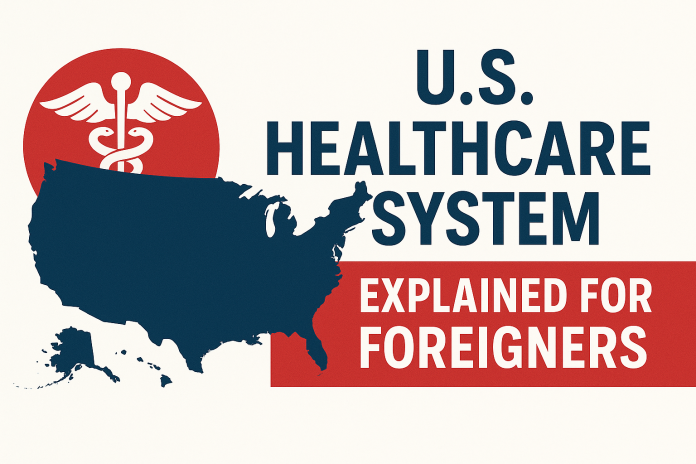The United States has one of the most advanced but also one of the most complicated healthcare systems in the world. Unlike many countries that offer universal healthcare, the U.S. system is a mix of private insurance, public programs, and out-of-pocket spending. For foreigners, it can feel confusing, expensive, and very different from what they know.
This guide breaks it down clearly.
1. No Universal Healthcare
The United States does not offer free healthcare for everyone.
Instead, Americans rely on:
-
Private health insurance (most common)
-
Public government programs (Medicare, Medicaid)
-
Out-of-pocket payments (paying the hospital directly)
Healthcare in the U.S. is mostly business-driven, not government-run.
2. Private Health Insurance (Most People Use This)
About 50% of Americans get health insurance from their employer.
How it works:
-
Companies buy health insurance plans for employees
-
Employees pay a part of it from their salary
-
Insurance covers hospital, doctor visits, tests, medicines
If you don’t have a job with insurance:
People can buy their own insurance through:
-
Private insurance companies
-
The government marketplace (HealthCare.gov)
Important terms:
-
Premium → Monthly insurance fee
-
Deductible → Amount you pay before insurance starts covering
-
Co-pay → Small fee you pay at each visit
-
Co-insurance → Percentage you share with insurance
3. Public Healthcare Programs (For Specific Groups)
A. Medicare
For:
-
People age 65+
-
People with certain disabilities
-
People with long-term kidney failure
Covers:
-
Hospital care
-
Doctor visits
-
Some medication plans
This is not free — people pay monthly premiums.
B. Medicaid
For:
-
Low-income individuals and families
-
Pregnant women
-
People with disabilities
Medicaid is free for those who qualify.
Each state in the U.S. decides its own rules for who can receive Medicaid.
C. Veterans Health Administration (VA)
For:
-
Military veterans
-
Service members injured in duty
Provides:
-
Free or low-cost medical care
-
Surgery & mental health care
-
Rehabilitation
4. No “One Price” System Costs Vary
One of the biggest shocks for foreigners is that U.S. healthcare is extremely expensive and prices vary widely, even for the same service.
Examples:
-
A simple doctor visit: $80–$200
-
Emergency Room visit: $1,000–$3,000
-
Surgery: Can cost tens of thousands of dollars
-
Ambulance: $500–$2,000
Without insurance, bills can be extremely high.
5. Hospitals Are Mostly Private Businesses
Unlike many countries where hospitals are government-owned, in the U.S.:
-
Most hospitals are private
-
Doctors work for private groups
-
Prices are set by the hospital, not by the government
There are public hospitals, but they are fewer.
6. Quality Is Very High But Not Equal Everywhere
America has:
-
World’s best hospitals (Mayo Clinic, Cleveland Clinic, Johns Hopkins)
-
Advanced technology and specialists
-
Fast access to new medicines and treatments
But:
-
Rural areas have fewer doctors
-
Quality varies by region
-
Low-income areas may have fewer services
7. Emergency Care Is Provided to Everyone
Even if someone has no insurance, hospitals must provide emergency treatment.
But the patient will still receive a bill afterward.
8. Prescription Medicines Are Expensive
U.S. drug prices are higher than many countries because:
-
Government doesn’t control medicine prices
-
Pharmaceutical companies set prices
-
Most insurance plans require co-pay for medicines
9. Why Is the U.S. System So Expensive?
Key reasons:
-
Administrative complexity
-
High salaries for medical professionals
-
Expensive medicines
-
High cost of medical technology
-
Profit-driven hospitals and insurance companies
10. For Foreigners Visiting the U.S.
If you’re traveling to the U.S., ALWAYS buy travel health insurance.
Even simple emergencies can cost thousands of dollars.
Quick Summary for Foreigners
| Topic | How U.S. System Works |
|---|---|
| Universal healthcare? | ❌ No |
| Main coverage | Private insurance |
| Government programs | Medicare, Medicaid, VA |
| Costs | Very high |
| Emergency treatment | Provided, but billed |
| Medicines | Expensive |
| Quality | High but unequal |
| Safety net | Limited |
Conclusion
The U.S. healthcare system is advanced but highly complex and expensive.
Foreigners should understand that America relies on insurance-based healthcare, not government-provided free services. Knowing these basics helps avoid confusion and potentially huge bills.



